#fandom linguistics
Text
me, stumbling across a video of Ben Willbond speaking Russian:

#like i'd been wondering if this was a thing i could have#cuz like it's very... brief and backgroundy in cabin pressure#the answer is yes!#it's christmas in march!#ben willbond#also filing this under#fandom linguistics#because it's my blog
25 notes
·
View notes
Text
a few informal thoughts on accent in written media and accent in translation
in light of a recent rb about dialect in haikyuu (which i recommend reading since i'm sorta responding to it but it's not required), i wanted to write down my quite complex thoughts about how "accent" is conveyed in written media, and how "accent" or "dialect" is translated cross-linguistically. it's really not a simple issue...
the biggest issue is that the very notion of an accent or a dialect as most non-linguists conceive of them is rooted in some form of bigotry, because there is almost always an underlying supposition that an "accent"/"dialect" exists in opposition to or as a deviation from the "standard." in written media, what that means is that some characters - often the main characters or the pov characters - have the privileged of their thoughts and words transcribed with standardised spellings and english teacher approved grammar (for the most part), and some characters - often but not always a character from a marginalised background or a character that is some way othered - are transcribed with intentional "errors."
(lmao readmore is deffo warranted this is a long one xx)
i want to give a very clear example of what i'm talking about, and i'm sorry to cite harry potter but it is a treasure trove for this kinda thing. also like... is it any surprise that jkr is particularly egregiously guilty of this... but anyways, look at that following passage from the philosopher's stone and watch the corresponding scene (hopefully the vid starts at the the part i want sorry youtube sucks)
“I'm a what?" gasped Harry.
"A wizard, o' course," said Hagrid, sitting back down on the sofa, which groaned and sank even lower, "an' a thumpin' good'un I'd say, once yeh've been trained up a bit. With a mum an' dad like yours, what else would yeh be?”
youtube
now to my american ears, both harry and hagrid in this scene have noticable differences in pronunciation compared to how i might say the same lines - there are so many ways their speech might be written differently (from my pov; from a british pov i'm sure they'd have some changes to make in writing down my speech i'll never be free from the wodder boddle jokes).
what i think is particularly interesting tho is that harry says the word "what" twice in the clip, with two different pronunciations. the first time he says it, he actually doesn't pronounce the /t/ at the end of the word (in technical terms, it's an unreleased unvoiced alveolar plosive), and the second time the pronunciation of the /t/ is exaggerated for emphasis (a particularly aspirated unvoiced alveolar plosive). but this difference in the way harry says these two words is not conveyed in the text of hp. harry simply says "what."
i wish i had a more direct example, but a very similar sort of thing is going on when hagrid says the word "and," which he pronounces with an unreleased voiced alveolar plosive - almost exactly the same as harry's first "what" - but instead of "and" being written with standard spelling, jkr opts to replace the "d" with an apostrophe.
it's essentially the same linguistic phenomenon, but because harry is supposed to be middle class and from surrey, his linguistic quirks are not conveyed in the writing because he speaks "proper" english - whereas hagrid's linguistic quirks (in this case it is the same quirk present in harry's speech) are meticulously documented because he is working class and uneducated, and his language is deemed a deviation from the standard. harry's english is unmarked and deemed unaccented because his variety is very close to the enforced standard. and the "standard" is just the speech of the privileged classes. sorry that reasoning reads a bit circular, but it isn't supposed to be logical, it is in fact a very illogical line of reasoning.
a lot of times, authors will justify their choice to transcribe accents because accents are often integral to a character's identity. and i do not disagree that many people take pride in their accents or that accents aren't used as a way to index for group/regional identity. but the issue is, when are accents faithfully being transcribed and when are they assumed?
as an example of this, look at these two passages from another problematic author, cassie clare in the clockwork prince:
"You think I’m a fool,” Molly went on. “This is a trap, innit? You Nephilim catch me selling that sort of stuff, an’ it’s the stick for Old Mol, it is.”
“You’re already dead.” Will did his best not to sound irritable. “I don’t know what you think the Clave could do to you now.”
“Pah.” Her hollow eyes flamed. “The prisons of the Silent Brothers, beneath the earth, can ’old either the living or the dead; you know that, Shadowhunter."
(tid.ii, prolouge)
and
"We’re in the Pyx Chamber,” he said. “Used to be a treasury. Boxes of gold and silver all along the walls.”
“A Shadowhunter treasury?” Tessa was thoroughly puzzled.
“No, the British royal treasury—thus the thick walls and doors,” said Jem. “But we Shadowhunters have always had access.” He smiled at her expression. “Monarchies down through the ages have tithed to the Nephilim, in secret, to keep their kingdoms safe from demons.”
“Not in America,” said Tessa with spirit. “We haven’t got a monarchy—"
(tid.ii, chapter 1)
i pulled these passages basically at random so maybe there are lines of dialogue that prove the point better (or disprove my point tho i doubt that, just based on my memory of these books), but in passage one, there are two speakers: an cockney woman from east london and a welsh man from an upper class background. i won't go line by line, but it's essentially like with the difference between harry and hagrid, where old molly has her shibboleths all written down whereas will is written with unquestionably grammatical speech.
in passage two, there are three speakers: the same upper class welshman, a lower middle class american woman, and a british-chinese (likely well off) man. we're told at certain points that will has a welsh accent; we can assume that tessa has an american/new york accent; i don't even know where i'd begin to describe jem's accent but it's probably not welsh or american. however, if you look at their dialogue, there is no way to discern any of these differences. their regional identities are all ostensibly important to them, as they are mentioned many many times in the narrative, but for some reason, it wasn't important enough to even make nods to their different accents? meanwhile, a random side character has their accent carefully laid out, dropped 'h's iconic slang and all? why? why is old mol's accent important enough to faithfully write down, but tessa and will's aren't? it couldn't have anything to do with classism could it...? surely not... (they say, with extreme sarcasm)
now, after all that. you might think my stance is that "accent" should never be written down because it necessarily involves classist/racist/otherwise bigoted judgement on what is marked and what is unmarked speech.
if only it were so easy.
honestly the biggest issue with jkr and clare's choices here is that it's so clearly coming from a place of ignorance and/or prejudice. there's nothing wrong with the way hagrid or old molly speak, and writing systems are inherently messy and inaccurate; there shouldn't be anything wrong with trying to more accurately convey utterances. before writing standardisation, people would just write what they thought a word sounded like, resulting in many if not dozens of accepted spellings for each word (sidenote: i've lost the email but i once spoke with someone that was attempting to reconstruct an older variety of english spoken in MA based on "spelling errors" in books from a small new england printing house it was a very cool project).
also, i am not african american so i can't fully speak to the accuracy of the AAVE, but i've seen discussion of how the AAVE and codeswitching in the hate u give by angie thomas was used to convey nuances in identity, and political realities in the US. the way people speak, the variety of language, and the attitudes they and others have towards that variety, are often extremely important narrative tools. as a black girl that also exists in white-dominated spaces, starr carter is aware of her speech and the changes she makes to fit in with white peers, but that doesn't mean that AAVE isn't a part of her, that it isn't important and valid. wouldn't it also be a bit disrespectful to write the AAVE in the hate u give as if it were standard english, when it is such an important part of starr's identity that it's not? AAVE is just as legitimate as a dialect as the dialect that starr's white peers speak, so on what grounds can anyone insist that it not be faithfully written down for its speakers? and lastly and most importantly, who am i, and who is anyone exterior to a linguistic community, to say how community members ought to write down their own speech/dialogue??
this is just one specific case, but i think when someone is writing from an in-group perspective, that changes things. it changes things immensely. there are so many reasons why a writer might choose to feature distinctive accents in their writing, and i don't think it's possible on their presence alone to make a judgement call on if the accent is being featured respectfully and/or with good reason, or if it is bigoted and unnecessary.
and this brings us to the somehow even more difficult question of what to do with "accents" when translating dialogue. not only do translators have to convey semantic meaning, they have to try to convey pragmatic meaning, cultural meaning, implications, and so on and so on. there is also the very important question of what is the role of a translator? i think that answer will depend on the individual, and unfortunately how one answers will have an impact on how they think translators ought to convey accent.
if the author of a text writes a character's dialogue from a prejudiced point of view, like jkr has done with hagrid, is it the role of the translator to dutifully convey the same (or as close to the same as possible) prejudiced implications in their translation? or does the translator have more of an editorial role, allowing them to convey the meaning in a way that won't carry the same connotations in the new language? does it matter what connotations were intended by the author? is the translator at fault for assumptions made by the audience of their translation due to the choice to convey an accent in one way or another? it is impossible to perfectly convey cultural nuances in accents so do we settle for the closest thing or do we forego it entirely and leave it up to something lost in translation? what about the translators own biases and prejudices, what do we do then?
honestly there are so many questions, and i don't have many answers. i err on the side that says the role of the translator is to be as faithful to the meaning of the text as possible, regardless of the translator's personal feelings about what is being conveyed. if an accent is being used purely for comedic effect, i do not think that the translator has the jurisdiction to say "well i think that's rude and ignorant so i won't include it," but at the same time, i think there should be multiple checks and balances, like sensitivity readers, that ensure that the translation is not introducing more prejudiced elements or pushing things even further than the source text.
what initially got me thinking about this was the post linked above about kansai dialect in haikyuu. the only characters that are written to not speak in tokyo dialect (otherwise considered the standard in japan) are the characters from inarizaki, a school in the kansai region. since they are the only characters to be explicitly written to be speaking a regional dialect, i would say it is probably an important - or considered an important by the mangaka - part of their characterisation. regardless of whether or not there should be cultural connotations to a particular variety is unfortunately not relavent in this instance.
i do think translators should not exaggerate the presence of an accent. from what i can tell from forums online, inarizaki's accents are pronounced but more than understandable, so i am liable to suspect some prejudice or mis-informed opinions when i see panels of the miya twins that are barely intelligible. but in general, i am of the opinion that translators should try and match as closely as they can the connotations of the source text, even if the source text is itself problematic. obviously there is not perfect choice. obviously a translation is never going to perfectly capture the original meaning.
in the end i guess these are two different discussions but i do think there is connection between the two. i understand the upset over egregiously translated accented dialogue, but at the same time, i do not think it is the translator's call entirely whether to translate it or not, however they do have a duty to at least try to match contexts as closely as possible. and as for the presence of accent in written media at all, it is really a case-by-case basis if i think it's being done well and with good cause or if it is just an example of ignorance, and i do think there should be room for nuance in this discussion.
come back next time when i ramble about how people write on the internet is a case study for how accent could be written in fiction lol xx
#some of the mutuals expressed support so i am posting#this is so long and honestly it should be longer#so if anyone has any questions comments or concerns#i am happy to hear them#linguistics#fandom linguistics#harry potter#the infernal devices#the hate u give#haikyuu#sociolinguistics#accents#translation
11 notes
·
View notes
Text
Fact: The earliest reliably dated use of the phrase “fucked up” appears in the court records of a US Navy court-martial case from 1863; the way the phrase is used suggests that its meaning was already well known at the time, but this is the first known printed record of it that we can confidently put a date to.
Additional fact: Bram Stoker’s Dracula is set in 1897.
Conclusion: It would not anachronistic for your Dracula fanfic to have a character describe the Count as a fucked up old man.
#media#literature#dracula#bram stoker's dracula#fandom#fanfic#history#language#linguistics#etymology#swearing#sherlock holmes could also say 'fucked up'#he wouldn't#but he could
67K notes
·
View notes
Text





PAINLAND WEEK - DAY TWO - MYTHS/LEGENDS
→ Sophus Helle, Gilgamesh — tablet XII, lines 87-95
#dead boy detectives#painlandweek#payneland#dbda#charles rowland#edwin payne#jayden revri#george rexstrew#dbdagifs#mygifs#dbdaedits#myedits#dbda and gilgamesh#if there's any babylonian scholars in the fandom#im sorry i tried my utmost best#my linguistics degree did not entirely prepare me for this#i did hours of research for this and i'm not even sure the cuneiform is right#because i could not find any visual documentations of these lines on tablet xii#and so i was relying on a.r. george's 2003 'the babylonian gilgamesh epic'#along with an akkadian dictionary and ePSD#and even then i'm not sure i have the right characters
694 notes
·
View notes
Text
Every now and then I think about how subtitles (or dubs), and thus translation choices, shape our perception of the media we consume. It's so interesting. I'd wager anyone who speaks two (or more) languages knows the feeling of "yeah, that's what it literally translates to, but that's not what it means" or has answered a question like "how do you say _____ in (language)?" with "you don't, it's just … not a thing, we don't say that."
I've had my fair share of "[SHIP] are [married/soulmates/fated/FANCY TERM], it's text!" "[CHARACTER A] calls [CHARACTER B] [ENDEARMENT/NICKNAME], it's text!" and every time. Every time I'm just like. Do they though. Is it though. And a lot of the time, this means seeking out alternative translations, or translation meta from fluent or native speakers, or sometimes from language learners of the language the piece of media is originally in.
Why does it matter? Maybe it doesn't. To lots of people, it doesn't. People have different interests and priorities in fiction and the way they interact with it. It's great. It matters to me because back in the early 2000s, I had dial-up internet. Video or audio media that wasn't available through my local library very much wasn't available, but fanfiction was. So I started to read English language Gundam Wing fanfic before I ever had a chance to watch the show.
When I did get around to watching Gundam Wing, it was the original Japanese dub. Some of the characters were almost unrecognisable to me, and first I doubted my Japanese language ability, then, after checking some bits with friends, I wondered why even my favourite writers, writers I knew to be consistent in other things, had made these characters seem so different … until I had the chance to watch the US-English dub a few years later. Going by that adaptation, the characterisation from all those stories suddenly made a lot more sense. And the thing is, that interpretation is also valid! They just took it a direction that was a larger leap for me to make.
Loose adaptations and very free translations have become less frequent since, or maybe my taste just hasn't led me their way, but the issue at the core is still a thing: Supernatural fandom got different nuances of endings for their show depending on the language they watched it in. CQL and MDZS fandom and the never-ending discussions about 知己 vs soulmate vs Other Options. A subset of VLD fans looking at a specific clip in all the different languages to see what was being said/implied in which dub, and how different translators interpreted the same English original line. The list is pretty much endless.
And that's … idk if it's fine, but it's what happens! A lot of the time, concepts -- expressed in language -- don't translate 1:1. The larger the cultural gap, the larger the gaps between the way concepts are expressed or understood also tend to be. Other times, there is a literal translation that works but isn't very idiomatic because there's a register mismatch or worse.
And that's even before cultural assumptions come in.
It's normal to have those. It's also important to remember that things like "thanks I hate it" as a sentiment of praise/affection, while the words translate literally quite easily, emphatically isn't easy to translate in the sense anglophone internet users the phrase.
Every translation is, at some level, a transformative work. Sometimes expressions or concepts or even single words simply don't have an exact equivalent in the target language and need to be interpreted at the translator's discretion, especially when going from a high-context/listener-responsible source language to a low-context/speaker-responsible target language (where high-context/listener responsible roughly means a large amount of contextual information can be omitted by the speaker because it's the listener's responsibility to infer it and ask for clarification if needed, and low-context/speaker-responsible roughly means a lot of information needs to be codified in speech, i.e. the speaker is responsible for providing sufficiently explicit context and will be blamed if it's lacking).
Is this a mouse or a rat? Guess based on context clues! High-context languages can and frequently do omit entire parts of speech that lower-context/speaker-responsible languages like English regard as essential, such as the grammatical subject of a sentence: the equivalent of "Go?" - "Go." does largely the same amount of heavy lifting as "is he/she/it/are you/they/we going?" - "yes, I am/he/she/it is/we/you/they are" in several listener-responsible languages, but tends to seem clumsy or incomplete in more speaker-responsible ones. This does NOT mean the listener-responsible language is clumsy. It's arguably more efficient! And reversely, saying "Are you going?" - "I am (going)" might seem unnecessarily convoluted and clumsy in a listener-responsible language. All depending on context.
This gets tricky both when the ambiguity of the missing subject of the sentence is clearly important (is speaker A asking "are you going" or "is she going"? wait until next chapter and find out!) AND when it's important that the translator assign an explicit subject in order for the sentence to make sense in the target language. For our example, depending on context, something like "are we all going?" - "yes" or "they going, too?" might work. Context!
As a consequence of this, sometimes, translation adds things – we gain things in translation, so to speak. Sometimes, it's because the target language needs the extra information (like the subject in the examples above), sometimes it's because the target language actually differentiates between mouse and rat even though the source language doesn't. However, because in most cases translators don't have access to the original authors, or even the original authors' agencies to ask for clarification (and in most cases wouldn't get paid for the time to put in this extra work even if they did), this kind of addition is almost always an interpretation. Sometimes made with a lot of certainty, sometimes it's more of a "fuck it, I've got to put something and hope it doesn't get proven wrong next episode/chapter/ten seasons down" (especially fun when you're working on a series that's in progress).
For the vast majority of cases, several translations are valid. Some may be more far-fetched than others, and there'll always be subjectivity to whether something was translated effectively, what "effectively" even means …
ANYWAY. I think my point is … how interesting, how cool is it that engaging with media in multiple languages will always yield multiple, often equally valid but just sliiiiightly different versions of that piece of media? And that I'd love more conversations about how, the second we (as folks who don't speak the material's original language) start picking the subtitle or dub wording apart for meta, we're basically working from a secondary source, and if we're doing due diligence, to which extent do we need to check there's nothing substantial being (literally) lost -- or added! -- in translation?
#translation#linguistics (sorta)#I love language so much#long post#subtitling#dubbing#transformative work#if you read all the way to the end - THANK YOU I am so impressed#localisation#this is not an academic essay but I still feel bad for not citing sources#low vs high context cultures and languages are concepts from intercultural communication studies#but idk how up to date that is or whether folks even still actually use them#I know they oversimplify things#but it helped me say what I was trying to here so shrug#languages#language soup#meta#language meta#fandom meta of sorts#thanks for the help sorting this out kayla <3#my nonsense
1K notes
·
View notes
Text
Mike mentioned at one point that he wished there were a tense for things that once had happened but have been undone by time travel (and I think I heard that there actually is such a tense in The Speech in the Young Wizards series, which I have not read.)
Now consider this: a tense for things that happen in at least one iteration of the future and are currently affecting the present via time travel, but are not necessarily still going to happen.
#woe.begone#linguistics#five dimensional chess#that time travel podcast#young wizards#fandoms i'm not in
416 notes
·
View notes
Text
wondering if anyone knows more about the change in the use/connotations of "handsome". obviously now it's a very masculine-coded descriptor, but it was used for women as well in the 19th (?) century. when i asked around, people said they assumed that even then, it was to describe women who were attractive but perhaps not conventionally pretty, and i'm wondering if that's an anachronism or accurate.
tldr: was handsome a gender neutral term for attractiveness in the past, or was it still aimed primarily towards masculine traits even when directed towards women?
#is this amrev? nah but i think someone in the community might know#linguistics#amrev#amrev fandom#history#history fandom
105 notes
·
View notes
Text
"Trent Crimm, the Independent" is a tongue twister created specifically for people from the mid-Southern United States
His name trips me up. I'm from Oklahoma (with some of my ancestors coming from Kansas City), and one feature of my dialect of English is something called the "pin-pen merger". Basically a short i or a short e before a nasal consonant both get pronounced like a short i. So that's 5 out of 6 of Trent's vowels. My accent is nowhere near as heavily mid-South as Ted's, but if I'm not consciously trying to fix it, I will pronounce "pin" and "pen" exactly the same.
I just think it's neat that the first character shown to openly challenge and be frustrated by Ted's American presence is someone whose name Ted has a very slim chance of pronouncing correctly precisely because of his thick American accent. Also just another delicious layer to Trent being charmed by Ted completely against his will.
26 notes
·
View notes
Text
I saw someone's fan art where Damian and Tim bond over bring autistic, and it made me imagine Tim Drake complaining that he can't connect w/ other neurodivergent tumblr folks because his entire family is nd.
Tim: Everyone else is talking about how alone they feel and how their families don't know what a meltdown is or refuse to modulate sensory input and I'm sitting here like, my family actually all got diagnosed at the same time because I sent my dad one (1) article about autism and he took action.
Jason, in his asks: hey u realize tumblr is about to rip u a new asshole rite?
Tim, answering publically: It's cool; I long for death.
#I keep forgetting the point of having a tumblr is to share stupid fandom thoughts with other nerds#batfam#tim drake#bruce wayne#damian wayne#truly believe that Tim uses semi-colons instead of comma splices#and Jason intentionally uses tumblr grammar because he's linguistically fascinated#shout out to blairthebrave for providing Jason's point when I told him this idea#he is correct
127 notes
·
View notes
Text
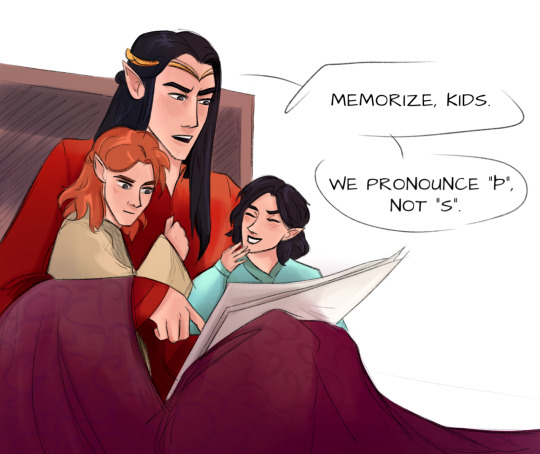
So much linguistic drama in Shibboleth of Fëanor.
That one th/s sound change that Fëanor cared about because the th appeared in his mother's name...I adore this detail, so decided to sketch Fëanáro teaching his children to pronounce correctly xD
#shibboleth of fëanor#tolkien universe#silmarillion#feanor#maedhros#maglor#linguistics#the silmarillion#tolkien stuff#digital art#tolkien fandom#silm memes#silm incorrect quotes#lotr#tolkien#feanorians#the lord of the rings#curufinwë fëanáro
781 notes
·
View notes
Text
it’s very funny to me that dnp are now perfectly comfortable saying ph*n while phannies are doing everything in our power to scrub the word ph*n from existence despite it being our foundation.
what do you mean ph*n is in the word phannie?? no it isn’t?? there are literally no letters in common?? you’re delusional??
ph*n?? you mean dnp?? the only term we have ever used to refer to dan and phil collectively?? how do you even get ph*n from dan and phil like those names together are dil and dil ALREADY EXISTS, IDIOT!! HE’S A SIMS CHARACTER!! WE CANT HAVE TWO DILS ARE YOU MAD??
phandom?? wh- actually no we can’t run from that one. that’s us, present and accounted for, your honour 🫡
#phan is bad but the worst thing we’ve ever done is phangirl#that’s horrific#a fucking abomination#dnp#dan and phil#phan#dan howell#daniel howell#amazingphil#phil lester#danisnotonfire#danandphilgames#d&p#dapg#phandom#phannies#phannie#fandom linguistics should be a subfield i wanna start it#like how things like ship names develop and are accepted in any given fandom zeitgeist#yeet my deet#yeet my deenp#pp42??#tmogar
101 notes
·
View notes
Text

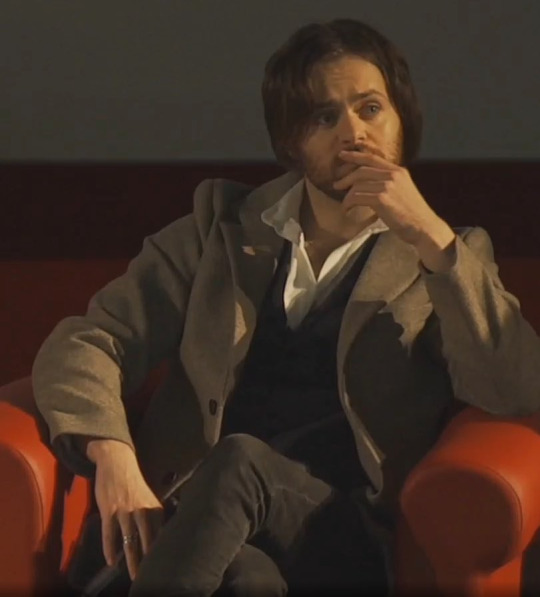





Mean people make me sad so here is Joey Batey being himself aka adorable, nerdy, precious, beautiful, talented, brilliant boy.
#Joey Batey#British Boy#Pretty Boy#Handsome#Hairy Boy#He's got so much fucking hair#We've an accord#if you ever touch or harm him#please rest assured#while you might not fear a man#to a FANDOM by the end you'll kneel and plea#'Cause he's more than what the haters make him seem#Indie#indie alternative music#The Amazing Devil#vocalist#writer#musician#linguistic#Jaskier#Julian Alfred Pankratz#Gorgeous Gorgeous Boys#stay away from social media for their mental health#and dare eco conscious#kind and caring and brave
507 notes
·
View notes
Text
Furbish From a Linguistic Perspective
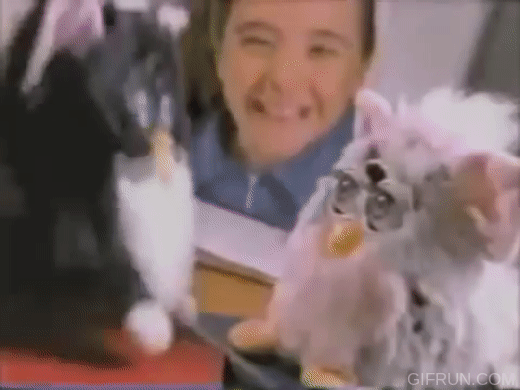
hi! if you're familiar with furbies you probably know the very short conlang (a sketch fictlang in particular) furbish! furbish is the language furbies speak before you "teach" them english by taking care of them. i will only be covering the '98 language, as the 2005 and 2010 language updates break some of the language rules the '98 version sets up, and I don't want to deal with that atm. also, do note i'm not a linguist, i just watch a lot of conlang critic
Phonology
Consonants
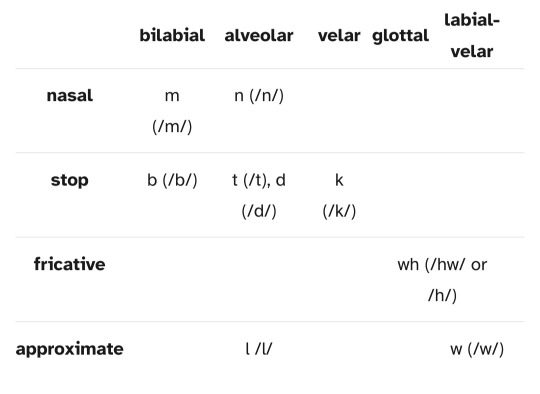
furbish has 9 consonants, with one digraph (wh) counting as a consonant for simplicity's sake. these consonants are /m/, /n/, /b/, /t/, /d/, /k/, /hw/ or /h/, /l/, and /w/.
Vowels
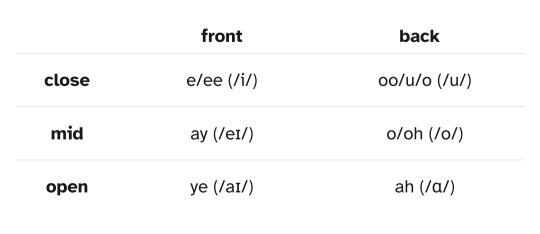
furbish has 6 vowels (including 2 dipthongs): /i/, /u/, /eɪ/, /o/, /aɪ/, and /ɑ/.
Syllables
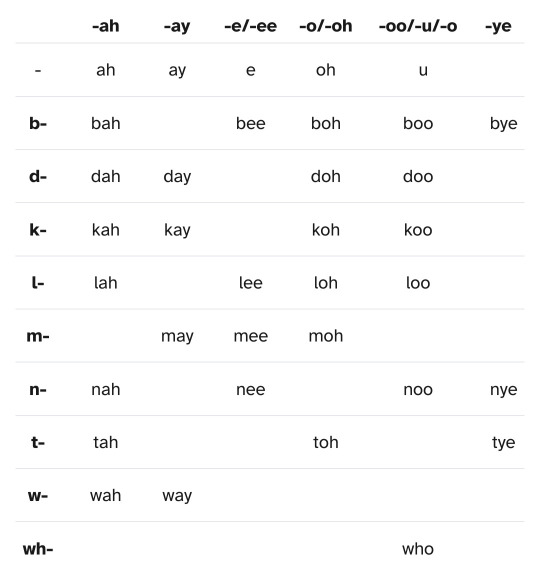
syllables are made up of vowels and consonants, shown in this chart. There are a total of 35 syllables in furbish.
Morphology
to make a word, syllables are put together using dashes, though some words are syllables on their own. additionally, new words can be created by putting a dash in between two existing words; like "ay-ay-lee-koo" (listen), a compound of "ay-ay" (look) and "lee-koo" (sound).
Grammar/Syntax
furbish seems to work almost the same as english grammar-wise, with a few differences. like many languages, it follows the subject–verb–object word order. for example, "i love you" would be "kah may-may u-nye". verbs have no conjugations and there are no tenses in furbish, along with there being no distinction between a singular and plural noun. most adjectives and nouns in furbish also work as verbs, and a word/phrase equivalent of "to be" does not exist. verbs have no conjugation, and adverbs go in front of the verb. it has two final particles, "doo" as a way to express that a question is being asked (similar to "ka" in japanese) and "wah" as a way to express excitement.
Proposals (Non-Canon)
i have a few proposals to make furbish a fuller language. for starters, making more syllable combinations for coining new words. secondly, a furby alphabet. each letter would represent a furbish syllable. another thing is filler words. i believe "ah" would be a great filler word, as furbies tend to say it a lot while being played with. i also suggest "doo", which could work as the furbish speaker questioning what they should say. finally, i've come up with a canon name for furbish in furbish. "kah-lee-koo", a compound of "kah" (me) and "lee-koo" (sound). roughly translated it means "my sound".

I'm autistic about furbies and conlangs fascinate me, so I had to make this!! I hope you all enjoyed :]
#furby#furbish#conlang#linguistics#conlanging#furby fandom#vurr.txt#autism off the charts#i wrote this a while ago but am JUST posting it now
297 notes
·
View notes
Text
friends who speak other languages: what do you say at the end of a fairy tale?
thinking about how und wenn sie nicht gestorben sind dann leben sie noch heute (and if they haven't died then they're still alive today) is so different from and they lived happily ever after and wondering about other possibilities... will you share? I would love to hear obsolete/silly/uncommon/satirical versions too!
yes, this is for a fic which I haven't actually started yet but I'm already thinking about the last line sshhhh
feel free to reblog!
#writin stories about stories babyyyyy#sorry for fandom tagging this but I know my Sandman/Dreamling folks will have Things To Say#the sandman#dreamling#writing#fairy tales#language#linguistics#yes obviously I can google this but then I don't get attention from my mutuals on the interweb
326 notes
·
View notes
Text
why shax misspelling toast actually makes so much sense and says a lot about this ridiculous language of ours
Yeah this is a post I'm making now, fight me. I was trying to explain spelling bees to @komorezuki and she mentioned the demonic misspellings being understandable now because English is, well, English (other languages do not have spelling bees, and now that I think about it, having international competitions where even native speakers are struggling to spell words is a wild concept).
And Shax is actually being so logical when spelling toast as t-o-s-t-e. Especially with the hesitant addition of the e. Here's why.

Because in English, often, the e is added at the end to elongate the vowel sound. This is probably best explained with examples.
Think about how you would have pronounced 'tast' out of context versus taste. The first one has an 'a' sound that resembles apple, right?
(Side note, the double consonant often performs the opposite function of the e, it shortens vowel sounds, like apple vs able. 'Abble' would have a short a and 'aple' would have a long a, which is why they're not spelt that way. Another example where both the e and the double consonant get illustrated perfectly is the word app verses the word ape.)
Also, ad verses -ade (like youtube ad vs lemonade). Right? So toste rather than tost. Shax was operating logically when she added the e.
Except well, English is a fuck-all free-for-all fuck-it-let's-ball language. If you squint at a section it makes sense and then you look at another section and it doesn't at all.
Like cost is short vowel, but coast makes it long, it isn't a 'coste'. So it's actually toast, rather than toste.
But also post doesn't need an e at the end and it's still a long vowel. Caste has an e at the end and is pronounced the same as cast, with the short vowel.
Yeeeeeeep.
Shax gets a gold star for logical thinking and effort.
#good omens mascot#good omens#weirdly specific but ok#asmi#maggots#the first meta to be written about t-o-s-t-e?#i'm doing god's work here in this fandom#good omens fandom#neil gaiman#english#english language#linguistics#english is a funny language#to put it charitably that is#shax good omens#shax#gold star from crowley for you shax#good omens funny#toste#so real for that honestly#vowels
57 notes
·
View notes
Text
The Power of Understanding / Pilot (Part 1 v2)
Rewritten to v2 on: 2023/09/10
Cheat Sheet
Read of Ao3
Chapters: Pilot, Part 2, Part 3, Part 4, Part 5, Part 6, Part 7, Part 8, Part 9
Summary: You have been with the Chain for a while now, as their "scholar" and translator. You know everything about them, because you are from our world. But do *they *know the truth about how you can understand everyone?
A little introduction and world building concept for the Translator!Reader and her adventures. Check notes below for more info!
Non-linear fic.
AU fic, prior to TotK (instead of TotK, chain events happen).
Loosely based on the same reader in my NSFW fic, which is a very loose prequel to this one, and a work in progress.
More background info to come, if I feel like it :D
Warnings: None, maybe some cussing, but nothing is censored. SFW content.
Points of interest: This is your thing if you are into the mystery of chain being able to talk to each other. I am an actual trained linguist IRL, hence this HAD to be written!
You were daydreaming in the middle of the day about him again, amidst the smell of horse shit around you, when you're supposed to be finishing the work you have until the end of the day. Or until a new portal pops up to swallow you all to Goddess knows which Hyrule this time. Damned black-blooded monsters. At least, this gave you some break.
You, coming from our own era, have been acting as the scholar of the Chain for the last couple of years, while hopping from world to world with them. Knowing this, Malon put you to work on the books of the ranch, instead of letting you deal with the cows or the horses, even though you really didn’t have anything specific to do with maths. You thought she was being kind to you, not letting you deal with dirty ranch work, you guessed? She was a sweetheart either way.
You wanted to hang out with Twilight at the same time, so instead of using the little study Malon offered, you took the books and went down to the stables. You continued with your own stuff, while he was taking care of the horses.
There was also this little thing: you were the only one who understood every single one of them, (almost) very clearly, comparatively speaking. Sure they could communicate without you just as well, but due to a bunch of coincidences, you were the closest thing to the “translation magic”, if you can call it that. Maybe it was your Hoshi Sato gene*. Maybe it was the fact that you actually stayed with Link & Zelda in the post-Calamity world, around two years prior meeting the Chain**, maybe a bit of magic was also involved. Hylia works in mysterious ways! Did it almost cost you your brain? Yes. Was it worth it? Absolutely.
Some Links, of course, understood each other better than the others, especially when their eras were, linguistically speaking, not that far. Time and Twilight were just fine. Legend and Hyrule were already able to understand each other, even a little bit better than Time and Twilight. Sky was a bit further away and had a “funny way of saying things” (according to the Sailor), almost gibberish, but when you listened and when he spoke slowly enough, you could at least get the gist of what he was trying to say. Wind, Time, and Warriors already knew each other from other “incidents” before the Chain, so they already had a way of communicating.
These worlds also did not have many invasions and wars by “outsiders”, if you don’t count things like the Triforce War, Imprisoning War, Sealing War, and of course, anything that had to do with Demise, Ganon & co. and their horrible reincarnations. This meant, not a lot of language change.
In the end, what happened was that over the two years you have been together with the group, you helped them understand each other better. They adjusted their accents, and somehow warped the Hylian they speak in a way that the group would understand (and especially you), when the dialogue was still within the group. Of course, the Old Man would speak more “naturally” with Malon and vice versa, and some of the chain would adjust better (e.g. Twilight or Smithy) to the language of the era they are in. After some point, communication was not that much of a problem. You learnt it all in the end.
Writing?
Funny enough, Wild, Sky, and Twilight had similar scripts. Time and Wind had more similar writing systems. Wild, Wars, Legend, Time, and Rulie were also better at understanding the scripts of their respective eras. Overall, other than a couple of hiccups, most understood the others’ script to an extent.
And then there was Wild. Also known as “The Cook” nowadays. The rest of the chain didn’t know you called them the Chain in your mind, and had your little nicknames for them. The nicknames most likely revealed a bit too much, and even though most of the secrets were out nowadays… You knew better than to risk more. You have caused enough damage, you would think sometimes. Even though you just couldn’t resist the urge.
Anyway… Wild, his case and communication issues… were complicated.
According to the rest of the chain when you guys first met, whatever he was saying (and vice versa) was almost complete gibberish at first. Some terms and special names like “deku,” “korok,” “Hylia,” “Hyrule,” “rupee,” and such were still there, albeit with a different accent, and they helped, but it was not enough. You only found out later that it was kind of… your fault.
In the end, he was also able to communicate with them just fine. Each Link had their own… language variation and accents, so to say. Some of them did not even have the difference enough to call it a “dialect” comparatively. As you thought, language change is a slow enough process, and with the lack of ‘conflicts’ (for lack of a better word) compared to your world, no wonder they were still somehow able to understand each other. .
The Goddesses work in mysterious ways indeed.
How did it work for you, though? There was this little secret that… First time around, when you first dropped into Wild's Hyrule, “Hylian” was basically a weird mesh-up of English and Japanese to your ears, after the enchantment from the Great Fairies you have received. It was “so you could slowly understand and grasp and communicate”, you were told.
Oh boy, it really felt like a genie granting you a wish, but in its own twisted way. You found that out later though.
Second time around when you first met the rest of Links, though? The first enchantment… kind of messed everything up. Second time around, you actually ended up learning real Hylian. At least, the Hylian that was used as a lingua franca between you guys.
Of course, some learning skill enchantment was definitely not out of the deal this time as well, thanks to Rulie & Time and their fairy friends, and of course the Smithy. But what a disaster it had been! Well, it wasn’t your fault that the first time the enchantment was made, nobody calculated that you would meet the Links from other eras.
You also naturally know the reason behind why Links in kind of irrelevant eras could decipher each other's texts, even when they didn’t understand the words all the time. Some were based on the Latin alphabet, and some were on Japanese kana. No way you could clearly explain it to them.
“Oh, by the way, you are made by a game company called Nintendo, and this guy is called Miyamoto…”
Yeah, no. That didn’t go well last time. Nobody even understood what you meant.
That was a battle to fight for another day… Now, you need to focus on the budget of the Lon Lon Ranch. And not be distracted by Twilight’s statue.
________________
Notes:
Fanciest and most OP translator you will ever know. Star Trek Universe.
"You” already spent three years with Link and Zelda in Wild’s world and were enchanted by the Great Fairies (with Zelda’s involvement) for the improvement of learning abilities.
#linked universe x reader#linked universe au#zelda fandom#zelda fanfiction#tloz au#fanfic#link x reader#twilight x reader#wild x reader#flora x reader#zelda x reader#ethical non monogamy#polyamory#linguistics#languages#translation#linked universe#legend of zelda#fluff#pilot chapter#isekai#isekai reader#the legend of zelda#botw link#botw#zelda botw#story concept#fanfic concept#lgbtq community#language
135 notes
·
View notes